Karnataka’s most famous folk dances are the Yakshagana and Dollu Kunitha. Yakshagana is a Karnataka traditional theatre genre, whereas Kunitha are Karnataka ritualistic dances. Dollu Kunitha is a popular kind of folk dance in Karnataka. Dollu Kunitha is primarily done by men and women from the Kuruba community in Northern Karnataka.
Popular traditional dance forms from the Kodagu Region include Huttari Dance, Bolak-aat, Ummatt-aat, and Komb-aat. Dollu Kunitha, Beesu Samsale, Kamsale Nritya, and Somana Kunita are popular in Mysore. Kamsale is mostly practiced in Mysore, Nanjagud, Kollegal, and Bangalore. Readers do read the below article in its entirety, this article will be going to provide insights of the Folk Dances of Karnataka with Pictures.
Table of Contents
Important Folk Dances of Karnataka
Check the Important Folk Dances of Karnataka in the below table.
| Dance Form | Description |
| Gaarudi Gombe | Gaarudi Gombe, also known as Dollu Kunitha, is a vigorous and rhythmic dance form performed predominantly by men. It involves dancers beating large drums called “Dollu” and performing energetic movements, showcasing their strength and coordination. |
| Nagamandala | Nagamandala is a unique folk dance-drama performed in the Malenadu region of Karnataka. It is a ritualistic performance centered around the serpent deity, Nagappa. |
| Goravara Kunita | Goravara Kunita, also known as the Horse Dance, is a folk dance performed by the Kuruba community in Karnataka. The dancers wear elaborate costumes resembling horses and perform intricate movements to the beats of traditional music. |
| Togalu Gombeyaata | Togalu Gombeyaata, meaning “shadow puppetry,” is an ancient form of puppetry from Karnataka. Skilled puppeteers manipulate leather puppets behind a white screen, accompanied by music and narration, to depict mythological stories and moral tales. |
| Joodu Haligi | Joodu Haligi, also known as Stick Dance, is a traditional folk dance performed in coastal Karnataka. Dancers hold wooden sticks and perform rhythmic movements, showcasing their skill and agility. The dance is often accompanied by lively music and songs. |
| Dance of Karnataka (generic) | Karnataka has a rich cultural heritage with numerous dance forms. This category represents the overall dance traditions of Karnataka, including classical dance forms like Bharatanatyam and Kathak, as well as various folk dances specific to different regions. |
Folk Dances of Karnataka with Pictures
Karnataka consists of various folk dances, you can several folk dances of Karnataka with Pictures from below.
Goravara Kunita
Goravara kunita is a dance worshipping Shiva which is popular in the Mysore and North Karnataka regions. Gorava Kunitha is practiced in both the northern and the southern parts of the state with slight variations. Gorava Kunitha of Karnataka is typically performed by groups of 10 to 11 men. They usually belong to the singing tribe of the Goravas, who are strong worshipers of Lord Shiva.
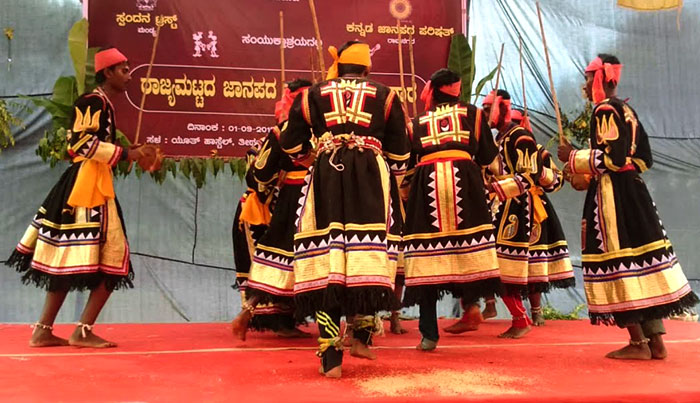
Togalu Gombeyaata
Togalu Gombeyaata is a type of shadow puppetry unique to Karnataka. Togalu Bombeaata is an ancient form of puppetry still popular in certain parts of rural Karnataka. They employ leather puppets and typically employ themes drawn from the epics and mythological stories.
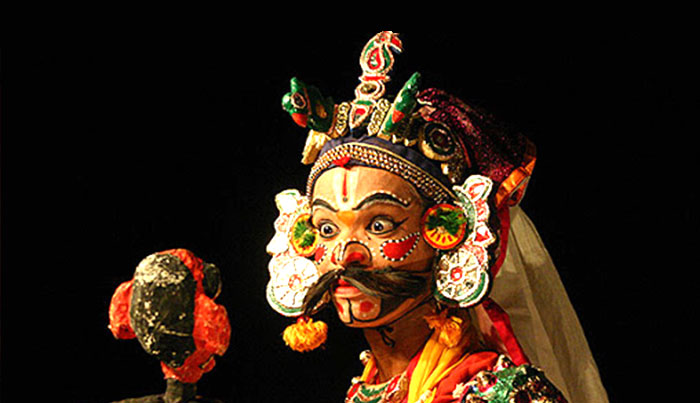
Gaarudi Gombe
Gaarudi Gombe is a folk dance in which performers wear bamboo stick costumes. In a Thigalas dance, the karaga is a metal pot on which stands a tall, flowering pyramid that is supported on the carrier’s head. Pata Kunitha is a popular traditional dance genre in Karnataka, particularly among residents of the Mysore district. Pata Kunitha, a Karnataka dance genre, is incredibly colourful and visually appealing. Puja Kunitha is a traditional ritualistic folk dance in Karnataka, particularly in the regions of Bangalore and Mandya. It is incredibly colourful and visually appealing.
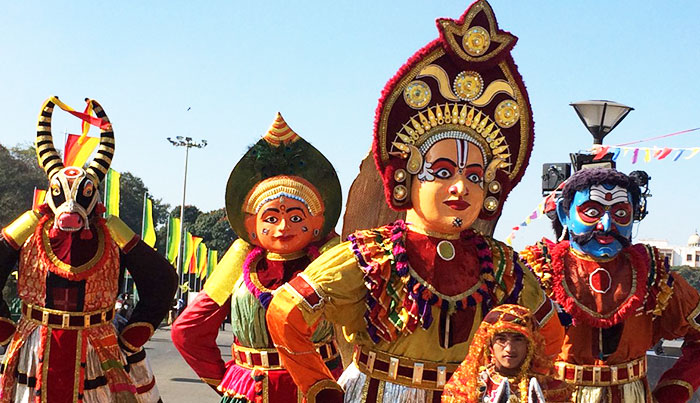
Nagamandala
Nagamandala is an extraordinary night-long ritual dance done in south Karnataka to calm the serpent spirit. The serpent of Karnataka’s Nagamandala festival is commonly seen as a sign of fertility and an embodiment of life-force. Nagamandala is celebrated in Karnataka with music, dance, ritual chanting in Sanskrit and Kannad, and the possession of the head-priest.
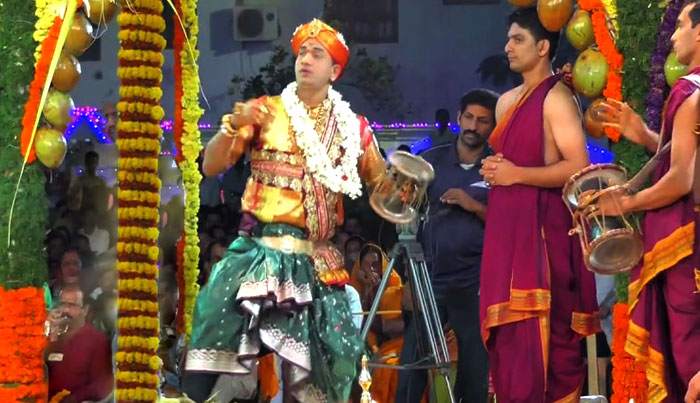
Joodu Haligi
Two percussion instruments are used to execute the Joodu Haligi. The Haligi is a round game played with a small stick made of buffalo skin. The dance is distinguished by two or three performers’ tremendous intensity and dramatic expressions. One of the dances performed at the Mysore Dasara is Veeragase, a powerful dance based on Hindu mythology. It is most commonly observed during the Hindu months of Shravana and Karthika. Krishna Parijatha is a traditional folk theatre form from Karnataka that is sometimes considered a hybrid of yakshagana and Byalatta and other times as a regional version of yakshagana.
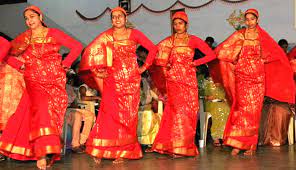
Yakshgana
Yakshgana is a Karnataka folk theatre form that dates back centuries. It is related to numerous Sanskrit theatrical or play traditions and practices, particularly those of the Purvaranga and the existence of a character, vidushak.The original form of Yakshgana involves the use of recitative modes of poetry, melodies of music, rhythm and dance techniques, colourful costumes and graceful make up. It distinctly differs in many ways from the norms of the Sanskrit stage, as it does not contain a highly elaborate language of hand and eye-gestures.
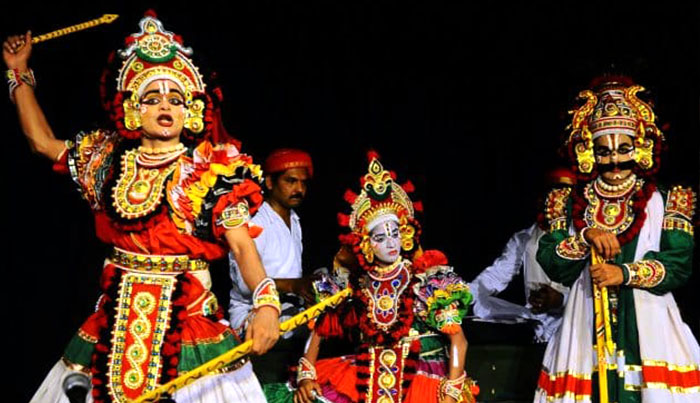
Dollu Kunitha Dance
Kunitha is considered as the ritualistic dances of Karnataka, of which the Dollu Kunitha is one of the ritualistic dances that are popular with the kurubas of ‘Beereshvara Sampradaya’. This is a very popular dance form of Karnataka, accompanied by the beats of the drums, and singing of the dancers. The beating drums are decorated by using colours or by flowers. Only the men of the shepherd community (Kuruba community) are privileged to perform this dance. The Dollu Kunitha is characterized by vigorous drumbeats, quick dancing movements and synchronized group formations.
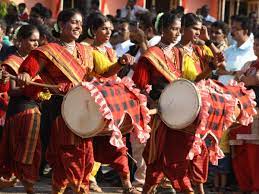
Folk Dances of Karnataka FAQs
Karnataka, a state in southern India, is rich in traditional folk dances. Some of the popular folk dances of Karnataka include Dollu Kunitha, Yakshagana, Veeragase, Kolata, Lambani Nritya, Huli Vesha, and Kamsale.
Dollu Kunitha is a dynamic and vigorous folk dance form of Karnataka. It involves a group of men performing rhythmic beats on large drums called “Dollu.” The dancers showcase their skill and coordination by creating intricate patterns and synchronized movements while performing to the rhythm of the drums.
Yakshagana is a traditional dance-drama form of Karnataka. It combines elements of dance, music, dialogue, elaborate costumes, and facial makeup. The performers, predominantly male, enact stories from Indian epics like the Ramayana and the Mahabharata.
While these folk dances have their roots in rural traditions, they are also performed in urban areas, especially during cultural festivals, religious ceremonies, and other special occasions.
Yes, these folk dances are often performed during various festivals and special occasions. For example, Dollu Kunitha is commonly performed during the annual Mysuru Dasara festival, while Yakshagana is a prominent feature of the Yakshagana Bayalata season, usually held during the months of November to February.

